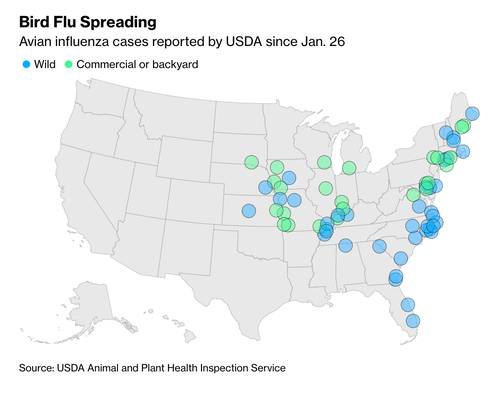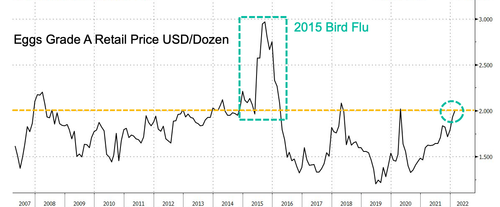Bitter eggs: bird flu risk threatens to create a price boom


Since the war was not enough to put the world's logistic chains in difficulty, avian fever is also making the world food supply more complex. A highly pathogenic avian flu (HPAI) is spreading across the United States. There is a high risk of spreading in Europe as well, so much so that the United Kingdom has indicated why free-range hens are kept in stalls, to prevent them from coming into contact with potentially infected wild animals.
Bloomberg reports that HPAI has been detected in commercial poultry operations, backyard farming, and wild flocks up and down the East Coast and throughout the Midwest since Jan.26. The United States Department of Agriculture (USDA) Animal and Plant Health Inspection Service (APHIS) has monitored its spread in compact waves across the United States. Standard procedures for farms where HPAI has been detected are the culling of infected farms. Last week, APHIS said 2.8 million chickens and turkeys died in one month from the virus. At least one million birds were recently culled at a poultry farm in Iowa.

Egg prices are starting to rise due to the loss of production, all as the traditional Easter peak in demand approaches.
The spread of HPAI to more farms, thus triggering more culls, even risks disrupting supplies of poultry products in general. Wholesale price increases are likely and will pass through to retail very quickly.
Urner Barry's data shows that wholesale eggs rose 10 cents to $ 1.60 a dozen on Wednesday, the most significant daily gain since the early days of the virus pandemic. The five-year average for wholesale eggs is about $ 1.44.

Since the spread of HPAI is recent, there is still no clear idea on the possibility of containing its spread. The latest outbreak, in 2015, resulted in the culling of 50 million laying hens in 15 states, pushing the retail prices of Grade A eggs to nearly $ 3 a dozen. Prices are currently for $ 2.
If you think that Europe can be safe from this infection, I would like to remind you that its transmission often occurs through contact between wild animals, migrants, and farmed animals and that, in any case, through drift (frozen or dehydrated eggs for the 'professional use) a crisis in North America is in any case having repercussions on the markets of other countries, when the USA begins to obtain supplies from abroad. We initially mentioned that the UK has ordered to keep farm hens indoors to avoid contact with potentially infected wildlife. In a world linked to the free market and globalization, no one is completely immune.

Thanks to our Telegram channel you can stay updated on the publication of new articles of Economic Scenarios.
The article Bitter eggs: bird flu risk risks creating a price boom comes from ScenariEconomici.it .
This is a machine translation of a post published on Scenari Economici at the URL https://scenarieconomici.it/uova-amare-rischio-influenza-aviaria-rischia-di-creare-un-boom-dei-prezzi/ on Sat, 19 Mar 2022 08:23:57 +0000.
